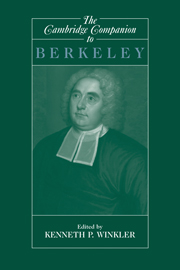Book contents
- Frontmatter
- Introduction
- 1 Berkeley’s life and works
- 2 Was Berkeley an empiricist or a rationalist?
- 3 Berkeley’s notebooks
- 4 Berkeley’s theory of vision and its reception
- 5 Berkeley and the doctrine of signs
- 6 Berkeley’s argument for immaterialism
- 7 Berkeley on minds and agency
- 8 Berkeley’s natural philosophy and philosophy of science
- 9 Berkeley’s philosophy of mathematics
- 10 Berkeley’s moral and political philosophy
- 11 Berkeley’s economic writings
- 12 Berkeley on religion
- Appendix
- Bibliography
- Index
2 - Was Berkeley an empiricist or a rationalist?
Published online by Cambridge University Press: 28 August 2006
- Frontmatter
- Introduction
- 1 Berkeley’s life and works
- 2 Was Berkeley an empiricist or a rationalist?
- 3 Berkeley’s notebooks
- 4 Berkeley’s theory of vision and its reception
- 5 Berkeley and the doctrine of signs
- 6 Berkeley’s argument for immaterialism
- 7 Berkeley on minds and agency
- 8 Berkeley’s natural philosophy and philosophy of science
- 9 Berkeley’s philosophy of mathematics
- 10 Berkeley’s moral and political philosophy
- 11 Berkeley’s economic writings
- 12 Berkeley on religion
- Appendix
- Bibliography
- Index
Summary
The distinction between rationalists and empiricists has become something of a punch-bag in recent decades, and we have been encouraged to pursue supposedly subtler analyses of purposes, influences and allegiances. One line of attack has taken the form of various attempts to divorce the “British Empiricist” Berkeley from either Locke or Hume, or from both Locke and Hume, and to hand him over to the Cartesians. The rationalist-empiricist dichotomy is then dismissed as a construct of nineteenth-century Kantians. My present purpose is to argue, on the contrary, that it is a distinction not only with ancient origins, but with a peculiar relevance to the interpretation of early-modern philosophy, not least that of Berkeley, just because of those origins. On the other hand it needs to be explained how such disagreement over the classification of Berkeley can have arisen.
- Type
- Chapter
- Information
- The Cambridge Companion to Berkeley , pp. 34 - 62Publisher: Cambridge University PressPrint publication year: 2005
- 22
- Cited by

